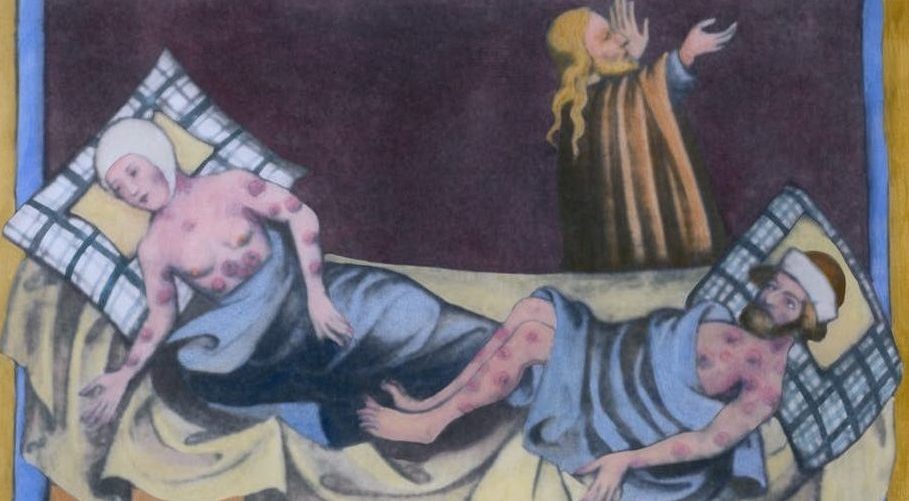Many admirers of the great reformer Martin Luther will recognize the significance of the date Oct. 31, 1517. This is the day that he is said to have posted his 95 theses on the church door at Wittenberg as an invitation to an open discussion and debate regarding his critiques of the Roman way. However, most will not be aware that nearly 10 years later, on August 2, 1527 to be exact, the bubonic plague was discovered in Wittenberg. Following the shutdown of the university at which Luther taught, as well as the sending home of the students, Luther was solicited by a pastor in Breslau to offer his advice on how to handle the public health crisis. In November of that same year, Luther penned a response to the clergyman and it was published as an open letter to all. You can read the letter in its entirety here.
First things first, the fundamental principle upon which Luther bases all the advice he gives in the letter is the command to love one’s neighbor as themselves. It is to the principle of neighbor love that Luther brings his readers back to over and over again. He seeks to apply this principle to three groups of people: those who want to flee for their lives, those who have an “official duty” to the city they live in and thus must stay, and those who decide to stay in the city but don’t do anything to restrict the spread of the disease.
Regarding those who desire to leave the city in order to spare their lives, Luther gives them leave due to their weakness. “Since it is generally true of Chistians that few are strong and many are weak, one simply cannot place the same burden on everyone.” This burden he mentions is the burden of staying put and helping those who are suffering. According to Luther, if a Christian is “weak” and therefore doesn’t have the faith to remain, he permits their departure….under one condition, “….no one should dare leave his neighbor unless there are others who will take care of the sick in their stead and nurse them.” For Luther, the “weak” are enabled to leave as long as the nursing and caring duties for those suffering is sufficient.
With respect to the “officials” of the city, Luther demands that they remain and do their jobs irrespective of the consequences to them personally. “Those who are engaged in a spiritual ministry such as preachers and pastors must likewise remain steadfast before the peril of death.” The same can be said for all public officials, “Accordingly, all those in public office such as mayors, judges, and the like are under obligation to remain”, because for Luther, as for Paul, “the governing officials are God’s ministers for your good.” According to Luther, the strength required for this task is the acceptance of one’s own death. It is not to be done in the expectation that God will protect them from death because they are doing what they are supposed to be doing. In fact, he exhorts them to pray, “Lord, I am in thy hands; thou hast kept me here; thy will be done. I am thy lowly creature. Thou canst kill me or preserve me in this pestilence in the same way as if I were in fire, water, drought, or any other danger.”
The last group of people that Luther applies his ethic of neighbor love to are those who have decided to remain in the city but do nothing to minimize transmission because of a belief that “God will protect them.” He describes these people in this way, “They are much too rash and reckless, tempting God and disregarding everything which might counteract death and the plague. They disdain the use of medicines; they do not avoid places and persons infected by the plague; but lightheartedly make sport of it and wish to prove how independent they are. They say that it is God’s punishment; if he wants to protect them he can do without medicines or our carefulness.” Luther saves his sharpest critique for this group. He asserts that “This is not trusting God but tempting him. God has created medicines and provided us with intelligence to guard and take good care of the body so that we can live in good health.” However, tempting God is not the worst of the sins of this group in Luther’s eyes. “It is shameful for a person to pay no heed to his own body and to fail to protect it against the plague the best he is able, and then to infect and poison others who might have remained alive if he had taken care of his body as he should have. He is thus responsible before God for his neighbor’s death and is a murderder many times over.”
It is quite true that the pandemic we find ourselves in currently has nowhere near the mortality rate as the plague that invaded Europe from the 14th-16th centuries. Nonetheless, I find Luther’s gracious word to the weak, his courageous exhortation to the city officials and clergy, and his dire warning to the negligent to strike a balance that still has applicability today. Perhaps the best way to end this brief historical reflection is to let Luther have the last word, “Use medicine; take potions which can help you; fumigate house, yard and street; shun persons and places wherever your neighbor does not need your presence or has recovered, and act like a man who wants to help put out the burning city…I shall ask God to protect us. Then I shall fumigate, help purify the air, administer medicine, and take it. I shall avoid places and persons where my presence is not needed in order not to become contaminated and thus perchance infect and pollute others, and so cause their death as a result of my negligence.”
This post was originally published at holytrinitybroomfield.com on Oct. 13, 2020.


